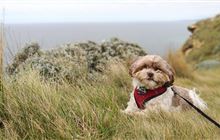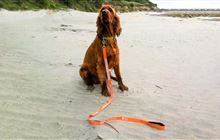Dog owners reminded to ‘know before you go’ this summer
Archived content: This media release was accurate on the date of publication.
Introduction
DOC is reminding people with dogs to do their research before setting out this holiday season.Date: 14 December 2022
As the holiday season approaches and people make their way to New Zealand’s iconic beaches and national parks, the DOC is reminding people with dogs to do their research before setting out.
“Going on adventures with your dog is a great way to stay active and enjoy nature,” says Laura Boren, Science Advisor at DOC.
“We want people to get outside and enjoy the summer, but to do it responsibly.”
DOC Rangers across the country report poor behaviour involving dogs - such as dogs attacking wildlife or people taking dogs where they aren’t allowed - is the most common compliance issue throughout the summer months.
“One potentially confusing thing is rules for dogs vary across the country,” says Laura.
“For instance, dogs are never allowed in national parks or on offshore island reserves, but they are permitted on certain walking tracks or campsites.
“The coastline can be even more confusing as rules can change seasonally, depending on breeding cycles for seabirds and other animals.”
If you’re headed somewhere new find out of it is dog-friendly before arriving. DOC has a “dogs allowed” tick box on its website allowing visitors to filter for dog friendly areas, and local council websites contain information on regional beaches and walking tracks.
“There is no one-size-fits-all approach to dog management,” says Laura. “This is why it’s crucial to do your homework.”
DOC’s Lead the Way programme offers other tips to help dog owners be responsible around wildlife, including a quiz which verifies dog owners as “wildlife-wise” and allows them to purchase a colour-coded lead which signals the temperament of their dog.
“Being wildlife-wise means you know the steps to protect coastal wildlife, such as walking on the wet sand, scanning the area ahead for wildlife, and staying at least 20 metres from any wildlife. It’s amazing how much a seal or sea lion can look like a piece of driftwood when it’s resting on the beach,” says Laura.
“Above all, when you’re out walking, stay present with your dog and aware of their behaviour. It increases your connection with them and allows you to anticipate any possible trouble.”
Coastal species such as korora/little penguin and kekeno/NZ fur seals are commonly attacked by dogs. Even seemingly harmless interactions, such as dogs chasing gulls, can distress birds enough to abandon nests or stop feeding chicks.
Infringement fines can range from $200 to $800 or a court prosecution, depending on the offence. In some cases where dogs have attacked native wildlife, courts have ordered the dogs to be put down.
“Nobody wants that to be part of their summer,” says Laura. “A bit of preparation can go a long way to keeping everyone safe this summer.”
Background information
Read more about DOC's Lead the Way programme.
The seven simple steps to share the beach are:
- Know before you go– check the rules at the beach before heading out. Not all beaches allow dogs, so make sure you know where you can and can’t walk them.
- A wildlife scan makes a good game plan– check what’s on the beach already so you are prepared and can plan where you will walk.
- A toy is a great decoy – keep your dog focused on playing with you and they are less likely to want to play with wildlife.
- Walk on the wet sand first-hand – staying on the wet sand keeps you further away from the dunes where many shorebirds will have vulnerable nests.
- Feet on sand – lead in hand – it’s a legal requirement to carry a lead when your dog is in public. Have it handy in case you need close control while you walk past a distraction.
- Keep 20 metres away from coastal creatures – this is the recommended distance to ensure your dog and the wildlife remain safe.
- Help ‘em out and give a shout – if you see wildlife on the beach, let others know so they can be prepared as well.
Contact
For media enquiries contact:
Email: media@doc.govt.nz


